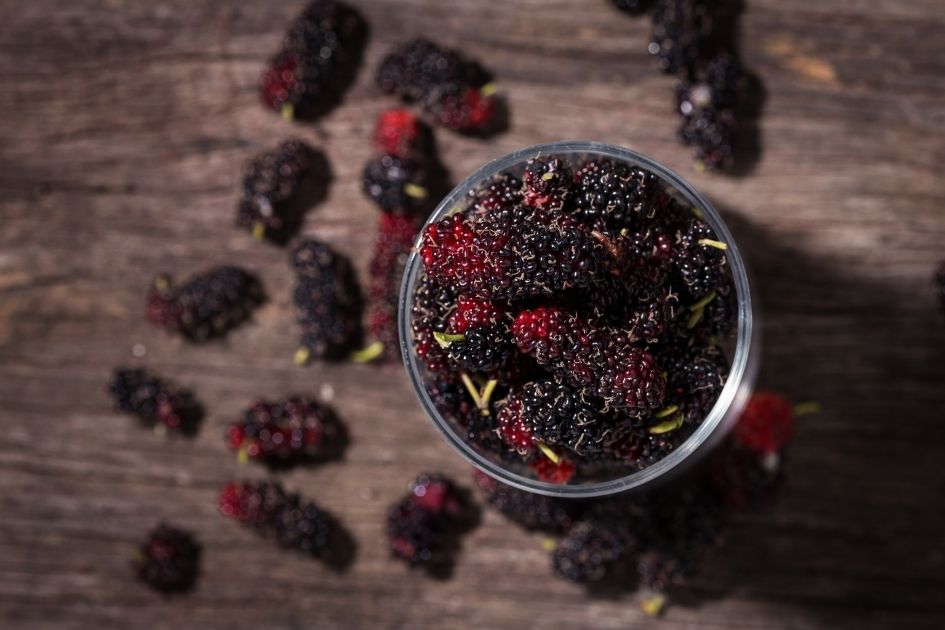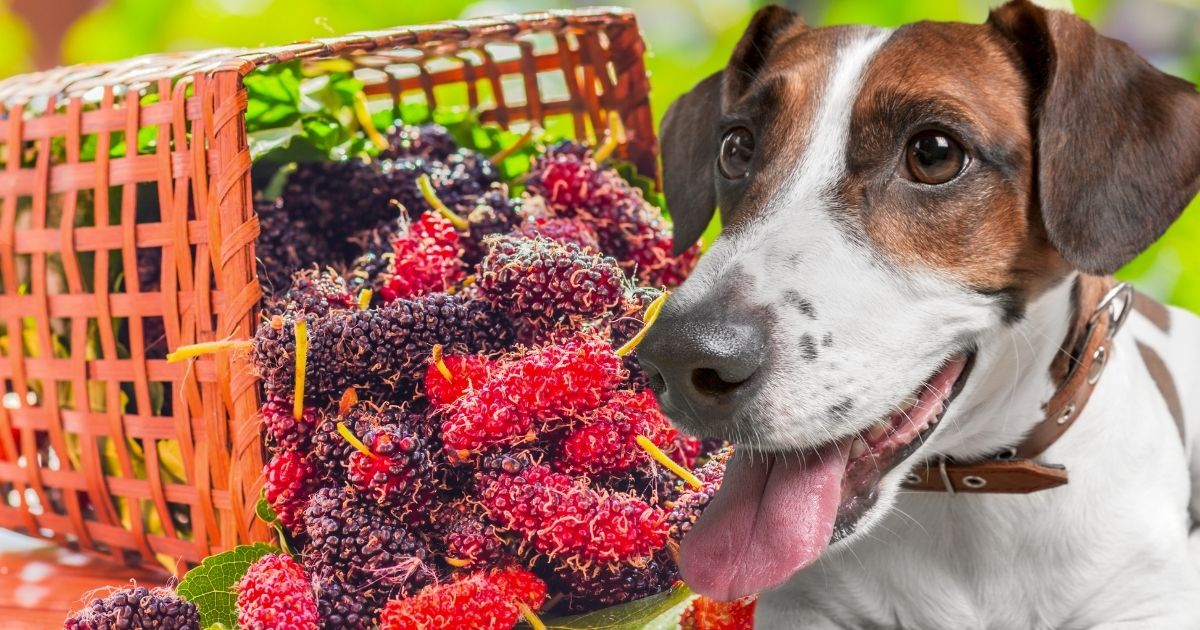Mulberries trees are quite common and grow almost over any plant space. They grow in your backyard, garden, thickly grown bushes, and sometimes even take roots in parks.
Mulberries’ common presence, coupled with their attractive scents, makes it a likelihood for your dog to come across them, and when they do, your guess is right; they would take a bite.
But can dogs eat mulberries? Are mulberries toxic to dogs?
This article explores everything you need to know about feeding mulberies to your pup.
Can Dogs Eat Mulberries?
Yes, dogs can have a small amount of ripe mulberries. They pose no harm to a dog’s system and can easily be digested.
However, if excessively consumed, your pet dog can fall ill. It may develop stooling; hence, dog owners should watch the quantity their dogs eat.
Also, it is worthy to note that unripe mulberries shouldn’t be fed to dogs.
As with humans, unripe fruits are likely to cause stomach upset in your dog than ripe ones; hence dogs should not eat unripe mulberries.
Unripe mulberries are said to cause hallucinating experiences in dogs and sometimes even in humans.
Ripe mulberries do not contain those chemicals that cause hallucinations.
What about white, black, and red mulberies? Are they ok for dogs to eat?
- White Mulberries are good for dogs to eat. It is usually found in northern America.
- Black mulberries are also safe for dogs to eat. The Chinese used the black mulberry for medicinal purposes.
- Red mulberries are no exception as they are also safe for dogs to consume when ripe. They are usually found on the southern and eastern coast of the United States, but they can be grown anywhere in any state.
Are Mulberries Good for Dogs?
Mulberries are a good source of vitamin C, iron, and balance sugar. They are made up of 80% water, 1.7% fiber, 0.4% fat, 1.4% protein, and 9.8% carbohydrates.
Thus, they can serve as a good nutritional snack for dogs as long as they are fed in moderation.
Mulberries only harm a dog’s system when too much of it is consumed for a long time.
Related: Can Dogs Eat Grapefruit?

Benefits of Mulberries to Dogs
- Aids digestive health: Mulberries contain soluble and insoluble fibers. Both of these aids the overall performance of the digestive system.
They make digestion much easier. However, if too much is consumed, they can make digestion too easy, resulting in stomach complications.
- Improves the blood’s circulation: Mulberries are rich in iron. Iron enhances the production of red blood cells and helps circulate oxygen to all cells, muscles, and other parts of dogs’ bodies.
- Good source of antioxidants: Antioxidants are essential substances for humans and animals.
They act as a body defender and fight off free radicals that can potentially harm organs and the overall function of a body.
Mulberries contain resveratrol, a kind of antioxidant that fights against aging in animals and humans.
- Builds healthy bones: Mulberries help build a healthy skeletal structure.
They contain calcium, magnesium, phosphorus, and vitamin K, which are all necessary nutrient elements for healthy bones.
- Fights cancer: Mulberries can be helpful in fighting against cancer. They contain anthocyanins which aid the prevention of tumor formation.
Cancer, however, is not a common disease among dogs; this is one health benefits dogs stand to gain from mulberries.
- Protects their brains: In the aspect of healing, bones are not the thing mulberries positively impact.
They play a vital role in healing brain cells by improving the system that works the repair.
Dangers of Mulberries to Dogs
Too much of anything isn’t good. This is true in the case of mulberries consumption.
While these fruits are beneficial to a dog’s health, they can do damages when excessively eaten. It is important to limit the quantity you feed to your dog.
If you’re feeding mulberries to your dog for the first time, feed a small quantity and observe carefully in case of an allergic reaction.
Most likely, your dog will enjoy them as dogs are rarely sensitive to them.
Some of the resulting side effects of excessive mulberries consumption in dogs are stomach upsets, coat staining, and frequent stooling.
Related: Can Dogs Eat Dragon Fruit?
How to Feed Mulberries to Dogs

The best and healthy way to feed mulberries to your dog is fresh and ripe from the plant. Anything aside, this can result in health complications.
Do not bake mulberries into treats and feed them to your dog. This isn’t healthy.
To begin with, the process of baking would have chemically broken down the nutrient compound contained in the berries and may not be effective or beneficial to your dog.
When feeding mulberries to your dog for the first time, a couple of berries will do to introduce your canine buddy to the taste.
As they gradually get acquainted with the consumption of the fruits, you can slightly increase the quantity but keep in mind the word “moderation.”
It’s ok to feed your dog a handful of mulberries once in week. Watch their reaction afterward for any change in behavior, allergy or sensitivity towards the berries.
If anything outside the usual doesn’t happen, then be rest assured you’re feeding it right.
However, if there’s any, it could be that you’re overfeeding it, and you should reduce the quantity.
We advice that you contact a veterinarian for advice on feeding your pooch mulberries.
Are Berries Toxic to Dogs?
Do not make the mistake of assuming other berries are safe for your dog to eat.
Mulberries being healthy for a dog to eat doesn’t mean other berries are. Some berries are poisonous and will do a great deal of damage to your dog’s health.
Some of these toxic berries are: holly berries, poke berries, bane berries, juniper berries, and mistletoe berries.
It is advisable not to feed your dog any fruits you’re are not acquainted with yet, unless you’ve done your research, and sure they pose no harm to your dog’s health.
Related: Can Dogs Eat Black Olives?
Can dogs eat cooked mulberries?
Although cooking mulberry doesn’t change the mulberry itself, it is safer not to feed your dog cooked mulberries.
You probably would have added seasonings like salt, sugar, flour, and other ingredients that are bad for dogs consumption.
Are dried mulberries toxic to dogs?
Mulberries are not toxic; however, when they’re dried, it is not best to feed to your dog as all chemical flavors it contains are more heightened due to its liquid evaporation.
Are mulberries and blackberries the same fruit?
Black mulberries and blackberries look very much the same; however, they’re not the same fruit.
Blackberries grow on thorny canes; on the other hand, mulberries grow on trees.
Are mulberries hallucinogenic?
All kinds of mulberries in their unripe state are hallucinogenic. When they are ripe, they are no longer hallucinogenic.
Final Thoughts
Mulberries are safe for dogs to eat. However, you should not allow your canine to consume too many mulberries, which can lead to stomach upset.
Moderation is the key to tapping into the rich nutrient benefits this fruit has to offer.
Also, be observant of allergies when feeding your dogs for the first time.
Hopefully, this article has given you a satisfying answer to your question.
You May Also Like: Can Dogs Eat Edamame? (Beans, Pods, Raw, Cooked)







